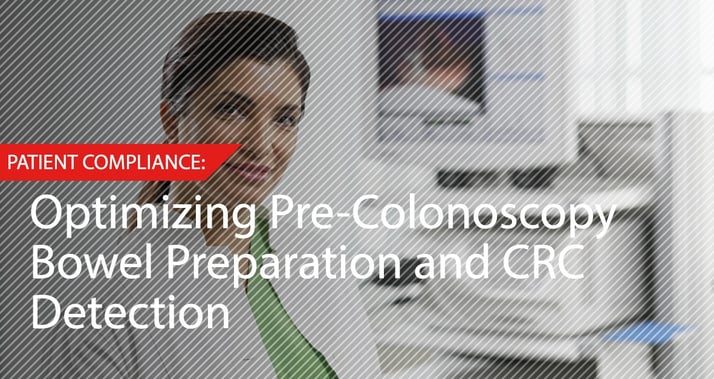
Colonoscopy is the modality of choice for the screening and prevention of CRC. The procedure should be performed every 10 years in average-risk patients aged 50 years and older. The colon must be cleansed of all fecal material in order for a clinician to perform a high-quality colonoscopy.
Unfortunately, inadequate or suboptimal bowel preparation pre-colonoscopy occurs in 20-30% of patients. It is not only associated with increased costs due to rescheduling and wasted resources, but also with longer procedure times and higher risk of procedural complications. Most importantly, inadequate bowel preparation can lead to decreased adenoma detection rates (ADR) and missed CRCs. The following blog explores barriers to adequate bowel preparation before diagnostic colonoscopy and ways to improve patient compliance.
Why Optimizing Bowel Preparation is Crucial:
If a screening colonoscopy is initiated or performed following inadequate bowel preparation, the test is considered poor-quality, and the patient is usually instructed to repeat the procedure within five years. Alarmingly, however, approximately 30% of post-colonoscopy CRC occurs within only three years of the colonoscopy.
Sessile serrated polyps and adenomas of the ascending colon, which resemble normal mucosa in color and are often covered with a mucus cap, are easily overlooked in cases of inadequate bowel preparation. This is of grave concern given these lesions’ particularly rapid progression to carcinoma. As a result, new guidelines recommend that clinicians repeat colonoscopy within 1 year if the bowel preparation renders them unable to identify polyps >5mm in diameter.
Patients whose bowel preparation is not optimal are at risk for bowel perforation, prolonged exposure to procedural sedation, and other complications. From a non-clinical standpoint, a rescheduled procedure demands that patients (and their escorts) rearrange their schedules and use additional work “sick” days. Gastroenterologists are also negatively impacted by their patients’ inadequate bowel preparation; they lose valuable work time, which decreases efficiency, and risk non- or decreased reimbursement for a low-quality procedure.
The Role of Non-compliance in Inadequate Bowel Preparation:
Compared to day-before bowel preparation regimens, split-dose regimens (half the dose the day before, and the other half the day of colonoscopy) have been shown to be associated with adequate colon cleansing and higher adenoma detection. Therefore, split-dose regimens are recommended for use for elective screening colonoscopies. Despite having been informed of the superiority of split-dose regimens on colonoscopy outcomes, however, only 62% of patients (N=1447) in a recent study chose the split-dose regimen.
Furthermore, another study demonstrated that 1 in 7 patients do not comply with the split-dose bowel regimen. Non-compliance with the split-dose bowel regimen is the strongest predictor of suboptimal bowel preparation, which ultimately leads to delayed diagnosis and treatment of CRC. Multiple studies have demonstrated that over 20% of patients undergoing colonoscopy have an inadequate bowel preparation.
Several factors have been shown to influence non-compliance:
- Low health literacy and native language other than English – both may contribute to an inability to follow bowel preparation instructions.
- Low socioeconomic class – may be associated with #1 and also related to life stressors.
- Specific bowel preparation regimen – specifically high volume and/or bad taste.
- Time of appointment – early-morning appointments are associated with lower compliance with the latter portion of split-dose regimens.
- Various patient-related factors: age >65, male gender, and presence of comorbid conditions (e.g. diabetes).
Steps to Improve Compliance:
Ensuring patients’ understanding of the bowel preparation instructions is the most important step towards improving compliance. Smartphone applications, visual aids, and culturally relevant verbal and written instructions are all effective tools to improve comprehension.
Split-dose preparation regimens, combined with later appointment times, have also been shown to improve compliance. When used in split-dose regimens, the preparation agent PEG-ELS was associated with a higher quality bowel cleansing and higher patient-reported compliance with bowel preparation (as compared to when PEG-ELS was used in single-dose methods).
Access to a telephone- or web-based portal, through which patients can ask procedure-related questions and receive appointment reminders, should be used to improve compliance. Providing patients with behavioral techniques (e.g. anti-emetics before and/or slow ingestion of the preparation agent) can make completion more tolerable, thus fostering compliance.
Conclusion:
Patient compliance is key to optimizing bowel preparation prior to a screening colonoscopy. As detailed above, a myriad of factors influence compliance, and several measures can be taken to mitigate those factors. Improved compliance leads to higher-quality bowel preparations, which, in turn, enhance procedural safety, decrease the need for rescheduling of procedures, lower healthcare costs, and most importantly, lead to higher ADRs and more effective prevention of colorectal cancer.
References:
Menees SB, Kim HM, Wren P, et al. Patient compliance and suboptimal bowel preparation with split-dose bowel regimen in average-risk screening colonoscopy. Gastrointestinal endoscopy. 2014;79(5):811-820.e3. doi:10.1016/j.gie.2014.01.024.
Radaelli, F et al. Barriers against split-dose bowel preparation for colonoscopy. Gut. 2016 April 19. [Epub ahead of print].
Rex, DK et al. Quality indicators for colonoscopy. Gastrointest Endosc. 2015; 81(1): 31-53.
Romero RV, Mahadeva S. Factors influencing quality of bowel preparation for colonoscopy. World Journal of Gastrointestinal Endoscopy. 2013;5(2):39-46. doi:10.4253/wjge.v5.i2.39.
Schoenfeld, P, MD, MSEd, MSc. “Patient Bowel Preparation Compliance: Practices to Improve Quality.” Gastroenterology and Endoscopy News. September 2016. Gastroendonews.com. Accessed September 19, 2016.
